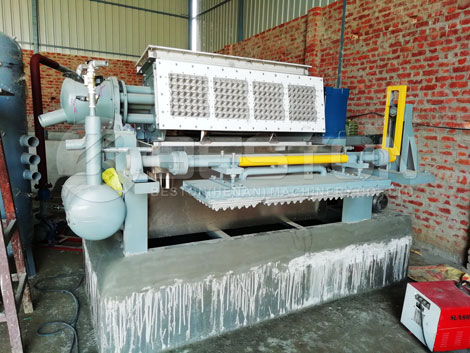Sustainable packaging has become a cornerstone of modern industries aiming to reduce environmental impact. An egg crate machine plays a pivotal role in this shift by enabling the efficient production of biodegradable and recyclable packaging. This equipment aligns with the principles of eco-conscious manufacturing while delivering practical and economic benefits.
Reducing Environmental Footprint
The egg crate machine operates using the paper pulp process, a method that relies on recycled paper as its primary raw material. This process minimizes waste by repurposing discarded paper, diverting it from landfills. Moreover, the production output is fully biodegradable, ensuring that the end products decompose naturally without contributing to pollution. The adoption of such equipment by industries is a proactive measure in combating plastic waste, which remains a significant global issue.
Versatility in Applications
Modern paper pulp egg tray making machine models are not limited to producing packaging for eggs alone. These machines can be adapted to create crates and trays for a variety of items, including fruits, glassware, and other fragile products. This versatility enhances their utility across industries, making them a valuable asset for businesses seeking sustainable and customizable packaging solutions.
Energy Efficiency and Cost Savings
Energy consumption is a critical factor in industrial processes. Advanced machines, often designed by leading pulp moulding machine manufacturers, feature energy-efficient mechanisms that reduce operational costs. Some machines integrate heat recycling systems, which optimize energy use during the drying phase. This results in lower electricity consumption without compromising production capacity, making these machines a financially prudent investment.
Streamlined Production Through Automation
The evolution of automation has significantly enhanced the functionality of the egg crate machine. Fully automated models can handle the entire paper pulp process, from raw material preparation to final drying. This streamlining reduces labor requirements and ensures consistency in the quality of the output. Additionally, automation minimizes the risk of human error, which is crucial in maintaining the structural integrity of the crates.
Supporting Circular Economy Practices
By converting recycled paper into new products, the egg crate machine made by pulp moulding machine manufacturers promotes circular economy practices. This approach not only conserves natural resources but also fosters a closed-loop production system. Businesses that implement such technology align themselves with global sustainability goals, improving their corporate social responsibility profile and appealing to environmentally conscious consumers.
Contribution to Industry Standards
The adoption of paper pulp egg tray making machine technology is becoming an industry standard in sustainable packaging. This shift is driven by growing demand from consumers and regulations pushing for eco-friendly solutions. Companies that invest in this equipment gain a competitive edge by demonstrating their commitment to innovation and environmental stewardship.
Conclusion
The egg crate machine stands as a testament to the potential of sustainable manufacturing. Through the efficient paper pulp process and advancements made by pulp moulding machine manufacturers, these machines offer a viable solution for reducing waste and supporting eco-friendly practices. As industries increasingly prioritize sustainability, the role of such equipment becomes indispensable in shaping a greener future.


